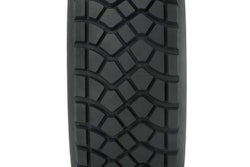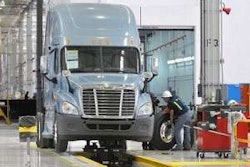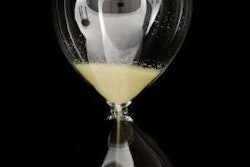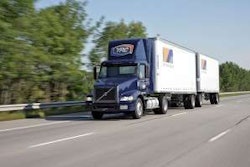Martin Daum, president and chief executive officer of Daimler Trucks North America, provided the keynote address at the Alternative Clean Transportation Expo 2011, where he discussed DTNA’s long-term leadership in diesel efficiency programs and alternative fuel options, making note of the company’s many achievements in these sectors, including BlueTec Emissions Technology; its five-year commitment to the U.S Department of Energy’s SuperTruck program for energy efficiency through advanced technologies; and bringing a factory-produced conventional natural gas truck to market.
Daum also noted some of DTNA’s partnerships, including the Department of Energy and its Clean Cities program, the U.S. Environmental Protection Agency, the California Energy Commission, the California Air Resources Board and many others. Through these partnerships, DTNA has achieved significant successes, such as the deployment of 400 Sterling and Freightliner NG tractors to the Ports of Los Angeles and Long Beach; and, together with the Maryland Energy Administration and DOE, a collaborative hybrid deployment project in which DTNA spearheaded the deployment of 143 hybrid trucks to Aramark Uniform Services, Nestle Waters, Sysco Foods and UPS.
In January, DTNA celebrated the production of its 1,000th hybrid-electric commercial vehicle. The company, which already has delivered nearly 1,600 NG-powered Thomas Built Buses and Freightliner Custom Chassis Corp. buses and walk-in-vans, also will deliver its 1,000th NG vehicle since 2008 under the Sterling and Freightliner brands later this year.
“DTNA is very proud of our important accomplishments in the efficiency improvement, natural gas and hybrid fields, but we have to continue to drive technology further,” Daum said. “We see tremendous growth opportunities for our lineup of ultra-efficient products, and are extremely excited about the market potential here.”
In addition, FCCC is going to deploy the first 40 hydraulic-hybrid walk-in-vans to UPS later this year and will begin delivering its first all-electric walk- in vans to customers by yearend. Thomas Built Buses is working to introduce Saf-T-Liner C2 and Minotour propane-fueled school buses in 2012.
In addition to Daum’s remarks, Dr. Wilfried Achenbach, senior vice president of engineering for DTNA, also provided insights on driving a concept to a reliable production-ready vehicle during a discussion on “Moving Towards Zero Emission Trucks for Regional Freight Movement.”
DTNA, a platinum sponsor of the conference, highlighted its array of alternative fuel products in its booth, including its Business Class M2 112 CNG and LNG trucks, a Freightliner Cascadia CNG tractor, a Business Class M2 106 Hybrid truck, Thomas Built Buses Saf-T-Liner HDX CNG and a Freightliner Custom Chassis All-Electric walk-in-van. The DTNA booth also featured other green efforts, including paper-free literature, recycled carpeting and environmentally-friendly giveaways.
“DTNA has developed some of the most advanced clean-burning alternative fuel products available today, clearly demonstrated by our wide selection of natural gas and hybrid-electric products,” dsud Richard Shearing, DTNA director of product planning. “By building upon our proven engineering, we can offer our customers the latest in alternative fuel products without compromising power, performance and efficiency.”
Beyond its products, DTNA has demonstrated its environmental commitment through other efforts, including achieving zero-waste-to-landfill status at its FCCC and Thomas Built Bus facilities. The Freightliner Trucks plant in Cleveland, N.C., and Thomas Built Bus’ facility in High Point, N.C., are home to 1,560 and 1,690 solar panels owned by Duke Energy, providing electricity to 79 average-sized homes. And new initiatives at Detroit Diesel’s Detroit-based manufacturing facility have helped the company reduce landfill waste by more than 54 percent and overall trash by 30 percent in one year.
DTNA’s commitment to green technologies is part of Daimler AG’s global “Shaping Future Transportation” initiative. Launched in 2007, the initiative focuses on reducing criteria pollutants, carbon dioxide and fuel consumption.












